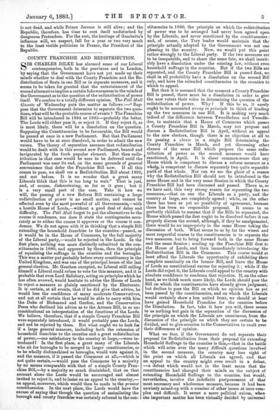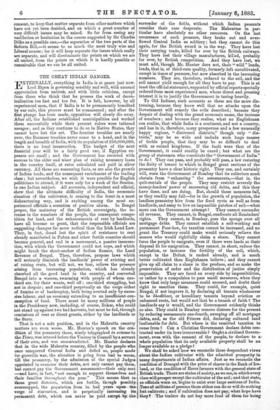COUNTY FRANCHISE AND REDISTRIBUTION.
SIR CHARLES DILKE has alarmed some of our Liberal contemporaries, both in the provinces and in London, by saying that the Government have not yet made up their minds whether to deal with the Comity Franchise and the Re- distribution of Seats in one Bill or in separate measures, and it seems to be taken for granted -that the entertainment of the second alternative implies a certain lukewarmness in the minds of the Government as to the question of the redistribution of power itself. We confess to a totally different opinion. The Pall Mall Gazelle of Wednesday puts the matter as follows :—" Sup- pose that the Government determine to separate the two ques- tions, what will be the probable course of events ? The Franchise Bill will be introduced in 1884 or 1885—probably the latter. The Lords will either pass it, or reject it. If they reject it, as is most likely, there will be a dissolution on the question. Supposing the Constituencies to be favourable, the Bill would be passed at once in a new Parliament. But that Palliament would have to be at once dissolved, in order to admit the new voters. The theory of separation assumes that redistribution would be dealt with in this second new Parliament, braced and invigorated by the fresh popular element. But then redis- tribution in that case would be sure to be deferred until the Parliament was near its end, on the same grounds of general convenience that defer the Franchise Bill now. If all this comes to pass, we shall see a Redistribution Bill about 1890, and not before. It is no wonder that a great many Liberals think that this is too long to wait." That is just, and, of course, disheartening, so far as it goes ; but it is a very small part of the case. Take it how we will, the passing of a new Reform Bill containing a large redistribution of power is no small matter, and cannot be effected even by the most powerful of all Governments,—with a hostile House of Lords,—without a good deal of delay and difficulty. The Pall Mall forgot to put the alternatives to the course it condemns, nor does it state the contingencies accu- rately as to either the course it approves or the course it con- demns. We do not agree with it in thinking that a simple Bill extending the household franchise to the counties—passed, as it would be in the House of Commons, by the full majority of the Liberal party,—would be rejected in the Lords. In the first place, nothing was more distinctly submitted to the con- stituencies in 1880, and approved by them, than the principle of equalising the suffrage in the counties and the boroughs. This was a matter put probably before every constituency in the United Kingdom, and was one of the principal issues of the last general election. Mr. Goschen excepted, no Liberal still calling himself a Liberal could refuse to vote for this measure, and it is probable that even Lord Salisbury, acting on principles which he has often avowed, would hesitate to advise the House of Lords to reject a measure so plainly sanctioned by the Electorate. It is certain, at all events, that if he did give that advice, he would lose the confidence of many moderate Conservatives, and not at all certain that he would be able to carry with him the Duke of Richmond and Gordon, and the Conservative Peers who declined his advice as to the Arrears Bill, in so un- constitutional an interpretation of the functions of the Lords. We believe, therefore, that if a simple County Franchise Bill were separately introduced, it would probably pass the Lords, and not be rejected by them. But what ought we to look for if a large general measure, including both the extension of household franchise to the counties and a great redistribution of power,—one satisfactory to the country at large,—were in- troduced? In the first place, a great many of the Liberals who sit for boroughs to be merged in larger constituencies, or to be wholly disfranchised as boroughs, would vote against it, and the measure, if it passed the Commons at all,—which is not quite certain,—would pass the Commons by a majority by no means comparable with that of a simple County Fran- chise Bill,—by a majority so much diminished, that on that account alone the Lords would be encouraged and almost invited to reject it, and to insist on an appeal to the country,— an appeal, moreover, which would then be made to the present constituencies. In the next place, the Lords would have the excuse of saying that though the question of assimilating the borough and county franchise was certainly referred to the con-
stituencies in 1880, the principle on which the redistribution of power was to be arranged had never been agreed upon by the Liberals, and never sanctioned by the constituencies ; and, of course, the Tory leader would maintain that the principle actually adopted by the Government was not one pleasing to the country. Now, we would put this point rather strongly to the Liberal party. If the two measures are to be inseparable, and to share the same fate, we shall inevit- ably have a dissolution under the existing law, without even household suffrage in the counties. But if the two Bills are separated, and the County Franchise Bill is passed first, we shall in all probability have a dissolution on the second Bill only, and have the extended constituencies in the counties to which to appeal.
But then it is assumed that the moment a County Franchise Bill is passed, there must be a dissolution in order to give the new voters their voice in determining the question of the redistribution of power. Why ? If this be so, it surely ought to be accounted wrong in principle to think of binding up the two measures in one Bill. It is making very much indeed of the difference between Tweedledum and Tweedle- dee, to maintain that a House of Commons which passes a County Franchise Bill in March, may not propose and discuss a Redistribution Bill in April, without an appeal to the new electors, though there is no objection at all to its passing a clause in a single Bill determining the County Franchise in March, and yet discussing other clauses of the same Bill which propose the same redis- tribution of power as the second measure would have sanctioned, in April. It is sheer common-sense that any House which is competent to discuss a reform measure as a wholp is competent to discuss separately two quite separable parts of that whole. Nor can we see the ghost of a reason why the Redistribution Bill should not be introduced in the same House and in the very same Session in which the County Franchise Bill had been discussed and passed. There is, as we have said, this very strong reason for separating the two measures,—that on one the Liberals as a party, and the country at large, are completely agreed ; while, on the other there has been as yet no possibility of agreement, because there has been no responsible proposal. It seems to us perfectly childish to assume that if the Bills be separated, the House which passed the first ought to be dissolved before it can properly discuss the second, although, if they be amalgamated, there would be no impropriety in the same House taking the discussion of both. What seems to us by far the wisest and most respectful course to the constituencies is to separate the two measures, but to bring forward both in the same House and the same Session ; sending up the Franchise Bill first to the House of Lords, and then immediately introducing the Redistribution Bill in the Commons. This course would at least afford the Liberals the opportunity of exhibiting their complete unanimity on the former Bill, and leave the House of Lords no constitutional excuse for rejecting it ; while if the Lords did reject it, the Liberals could appeal to the country with absolute confidence to condemn that rejection. If, on the other hand, as we think much more likely, the Lords should pass the Bill on which the constituencies have already given judgment, but decline to pass the Bill on which no opinion has as yet been passed by the constituencies, and on which the Liberals would certainly show a less united front, we should at least have gained Household Franchise for the counties before the Dissolution. In fact, take it how you will, there seems to us nothing but gain in the separation of the discussion of the principle on which the Liberals are unanimous, from the discussion of the principle on which they are certain to be divided, and to give occasion to the Conservatives to exult over their differences of opinion.
What we fear, if the Government do not separate their proposal for Redistribution from their proposal for extending Household Suffrage to the counties is this,—that in the battle which will arise over the many difficult questions involved in the second measure, the country may lose sight of the point on which all Liberals are agreed, and that an appeal to the country might even result in a defeat, —a defeat which would not in the least mean that the constituencies had changed their minds on the subject of extending Household Suffrage to the counties, but would, nevertheless, involve the indefinite postponement of- that most necessary and wholesome measure because it had been
unwisely mixed-up with a number -of other' issues at once com- plex and difficult. It seems a mere political axiom, when one important matter has been virtually decided by universal
consent, to keep that matter separate from other matters which have not yet been decided, and on which a great number of very difficult issues may be raised. So far from seeing any vacillation or hesitation in the course suggested by Sir Charles Dilke as a possible .one,—the separation of the, two parts of the Reform Bill,—it seems to us much the most truly wise and Liberal course; for it will keep separate the issues which really are separate, and will discriminate the points on which we are all united, from the points on which it is hardly possible or conceivable that we can be all united.















































 Previous page
Previous page